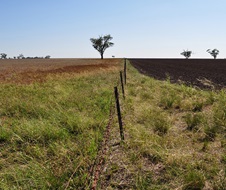New land management laws, which will improve both environmental outcomes and farmers’ productivity, will begin from tomorrow, August 25th 2017, Minister for Primary Industries, Niall Blair, and Environment Minister Gabrielle Upton said today.
 “The improved framework will provide greater fairness and flexibility to farmers so they can focus on what they do best, producing some of the best food and fibre in the world,” Mr Blair said.
“The improved framework will provide greater fairness and flexibility to farmers so they can focus on what they do best, producing some of the best food and fibre in the world,” Mr Blair said.
“The old laws pitted farmers against environmentalists, while doing nothing for productivity or biodiversity.
“The NSW Government is delivering a modern, innovative and integrated system that is balanced, scientific and evidence-based, and places farmers at the centre of efforts to reverse the current decline of biodiversity in NSW.
“The new system creates more options for farmers to boost agricultural productivity and manage private land for conservation, supported by 65 additional Local Land Services staff dedicated to this program on the ground.”
As part of the reforms, the Biodiversity Conservation Trust will be established to manage the $240 million private land conservation program.
Ms Upton said the Biodiversity Conservation Trust Board has been appointed, with its members bringing extensive experience in conservation of biodiversity, rural and regional land and resource management, financial management, and law and governance.
“The Trust will deliver the Government’s unprecedented investment in private land conservation. This investment is in addition to the NSW Government’s $100 million Saving our Species program,” Ms Upton said.
“For the first time, state-wide standards have also been introduced under the new system for development in local communities to avoid, minimise and offset environmental impacts.”
The Trust is also responsible for securing offsets for developers who choose to use the Biodiversity Conservation Fund to fulfil their biodiversity offset obligations.
The Biodiversity Conservation Trust Board consists of:
- The Hon Robert Hill AC (Chairman) – Mr Hill is a former Commonwealth Government Environment Minister and a former Permanent Representative to the United Nations for Australia. He is a member of the Asia Pacific Board of The Nature Conservancy and a Governor of WWF Australia. He Chairs the Cooperative Research Centre on Low Carbon Living at UNSW.
- Virginia Malley (Deputy Chair) – Ms Malley is a non-executive director of Perpetual Superannuation Limited, a member of the Clean Energy Regulator and a former director of the Nature Conservation Trust. She has 30 years’ experience in the investment and banking sectors, as well as in conservation and environmental initiatives.
- The Hon Gary Nairn AO – Mr Nairn became the Chairman of the Mulloon Institute following a 12-year term as the Federal Member for Eden-Monaro. He has extensive experience as a surveyor and he was the inaugural Chairman of the Northern Territory Planning Commission and on the board of the Northern Territory Environment Protection Authority.
- Renata Brooks – Ms Brooks is currently a Commissioner of the Australian Fisheries Management Authority and was previously Deputy Director General, Land and Natural Resources, in the NSW Department of Primary Industries.
- Russell Taylor AM – Mr Taylor is on the Council of the University of Technology, he is a senior Indigenous leader on a number of boards including The Australian and Torres Strait Islander Healing Foundation, and he was a member of the Nature Conservation Trust.
- Duncan McGregor – Mr McGregor is an environment and planning law specialist. He is a former partner and remains a Legal Consultant at MinterEllison. He was the inaugural Chair of the Commonwealth Domestic Offsets Integrity Committee as part of the Carbon Farming Initiative.
The reforms commit to the 43 recommendations of the Independent Biodiversity Legislation Review, which the NSW Government commissioned in 2014, and drew on feedback received during an extensive three-year consultation process with key stakeholders and the community.